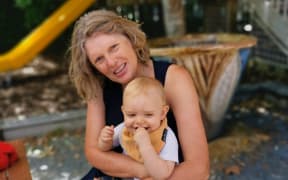
Photo: 123rf/ Georgiy Datsenko
A Wellington woman is angry the city has no public service for people with lymphoedema while those from most other regions can access funded care.
About one in five people develop the chronic condition after having lymph nodes removed during cancer treatment.
Jane beat breast cancer last year but has spent hundreds of dollars on specialists to reduce swelling in her upper arm caused by lymphoedema.
"It was really uncomfortable and it was quite puffy and swollen, I didn't know what to wear, I had no information as to how to manage it."
She is among more than a dozen people who have contacted RNZ about how funding varies from region to region.
Jane said the stress of accessing treatment had been overwhelming and she wanted the healthcare postcode lottery addressed.
In Nelson, for example, patients can see a lymphoedema trained physiotherapist and receive two funded compression garments every six months through the public health system.
"Everyone across the country needs access," Jane said. "It should be straightforward to get a diagnosis, you should have information available as to proper education through a specialist and access to garments, because I think there's no question that these garments are necessary for people and they make a real difference."
Jane said having not publicly funded lymphoedema service was unacceptable.
"For some people, it is inaccessible, which is pretty outrageous, because it's so clear cut that this is a direct result of that [cancer] surgery and it is progressive. That's the thing that is the worst, if people don't get on top of it, it gets worse."
In Auckland, Joyanne Lovatt knows what it is like to have lymphoedema go bad - in Sydney, she had seven-and-a-half litres of fat and fluid removed from her right leg in specialist surgery not offered in New Zealand.
A melanoma survivor, she said lymphoedema specialists working in the city's public health service have told her they feel like the ambulance at the bottom of the cliff.
"If you can't get in to see them, and the waiting lists are huge, you're just left to cope by yourself."
Physiotherapist Jenny Collett is trained in treating lymphoedema with drainage massage, bandaging and fitting compression garments.
She said it was positive that more people were surviving cancer, but that meant more were developing lymphoedema as a result of treatment.
Based in Palmerston North, she works part-time alongside one full-time therapist. She is concerned the public health system cannot offer the care they need.
"We have hundreds of patients on our books, but with the load we have, we're just unable to offer a full service where we're doing regular massage, in other words a best practice service."
She said those in the sector had lobbied for years for regional inequities to be addressed.
Many patients, like Graeme North, spend hundreds of dollars on private treatment.
Also a melanoma survivor, he was diagnosed with lymphoedema in his right leg 11 years ago, but it took years to get the right treatment.
"It took me probably the best part of a couple of years before I actually got the grade of garment that I really needed. In that time, my leg was in serious danger of uncontrolled swelling."
He recently moved from Auckland to Nelson, where garments were funded but not massage to drain the lymphatic system. He has yet to find a qualified therapist privately.
The Australasian Lymphology Association, which represents over 700 lymphoedema therapists, sent a letter to the then minister of health David Clark in 2019, calling for the government to address inconsistencies in the funding of compression garments and the provision of services.
"We would strongly advocate for increasing assistance for this hugely disadvantaged patient group, via specially allocated funding for lymphoedema management and a fairer system for all to receive the compression garments they require," the association wrote at the time.
Physiotherapist Yvonne Ferguson, who is on the association's equity committee, said it was revisiting the request with Te Whatu Ora.
Te Whatu Ora has been approached for comment.



